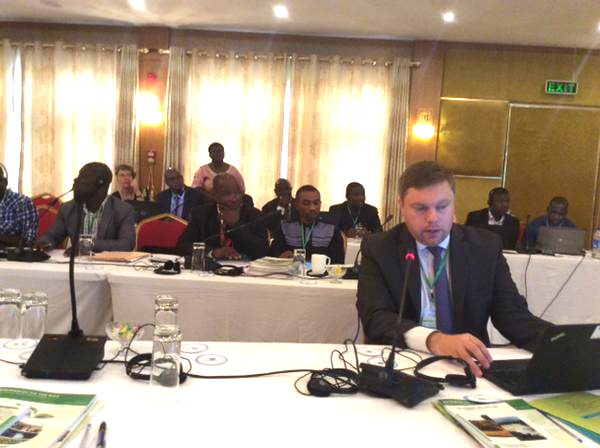Adaptation Fund Readiness Program Engaging Countries Directly in Workshop Series
Program Drawing High Interest in Convening Stakeholders Through Full Cycle of
Climate Finance to Project Design and Implementation
(Washington, DC, October 22, 2015) — As part of an ongoing effort to strengthen the capacity of national and regional organizations to manage climate financing and develop climate change adaptation projects directly, the Adaptation Fund has been conducting a series of workshops in developing countries that are home to many of the vulnerable communities it assists.
The latest workshop and ninth in the series, which is carried out by the Fund’s Readiness Program for Climate Finance launched last year, was held in Abuja, Nigeria late last month and co-organized with the Economic Community of West African States and the Heinrich Boll Foundation. Nigeria’s Federal Ministry of the Environment, country representatives from the region, partners and stakeholders including the Green Climate Fund also participated, along with several civil society organizations – a hallmark of the workshops as the Adaptation Fund maintains an open dialogue with NGOs to further sustainability and effectiveness of its programs.
Focused on opportunities for countries in the region to access climate finance, the Abuja workshop drew more than 60 participants and a high level of enthusiasm for the Adaptation Fund’s Readiness Program – which is designed to strengthen developing countries’ capacity to receive and manage climate financing.
Through the Fund’s innovative ‘Direct Access’ modality, countries can design and implement climate adaptation projects in vulnerable communities directly through accredited national and regional implementing entities. In an effort to increase the number of accredited entities to reach more climate vulnerable communities with adaptation needs, the workshop was aimed at imparting best practices to prospective entities in navigating the accreditation process and guiding those that are already accredited through steps to develop effective climate resilience projects.
“This was the third workshop in Africa, and really helped countries with the accreditation and project development processes,” said Adaptation Fund Board Member Yerima Peter Tarfa, a Nigerian national and Board representative for the African region. “The Adaptation Fund has pioneered the implementation of country-driven, tangible and scalable climate change adaptation projects in vulnerable communities through Direct Access. Funding is aligned with national processes, builds on local capacity and increases country ownership of projects.”
Regional climate and economic challenges, and key enabling factors to setting up National Implementing Entities (NIEs) in countries to directly access Adaptation Fund resources were discussed. “The scourge resulting from the impact of climate change in Africa and especially in West Africa is worsened by the poor state of economic development and low adaptive capacity,” said Nana Fatima Mede, Nigerian Permanent Secretary of the Federal Ministry of Environment, in opening the workshop which enhanced further understanding of modalities for accessing the Adaptation Fund and served as an interface for institutions and experts in support of scaling up Fund programs in the region.
High interest was also shown for the Fund’s other readiness support activities, including South-South cooperation between accredited NIEs and applicants in the same region to further knowledge of accreditation criteria and processes, and technical assistance to help countries identify and manage environmental and social risks when developing projects.
A success story was provided from Senegal’s NIE, Centre de Suivi Ecologique, about a completed Adaptation Fund project to protect highly exposed coastal communities in Senegal from storm surges and beach erosion while restoring rice growing lands. Through Direct Access, Senegal developed its capacity to implement projects and is now supporting other African countries going through NIE accreditation.
Among the most well-received aspects of the workshop were accreditation and project “clinics”, in which individual country delegations met privately with Adaptation Fund staff to review and develop solutions to specific questions and unique challenges about accreditation applications, project development processes, or environmental and social risk management. A streamlined accreditation process for smaller implementing entities to access financing was also discussed.
Keys to successful NIE accreditation presented at the workshop included:
- Showing strong institutional capacity, financial management, integrity and viability
- Capacity to identify, prepare and monitor projects
- A system for identifying problems as they occur so they are addressed before interfering with project objectives
- Demonstrating a mechanism to deal with environmental and social aspects of projects so they do not harm the environment
- A system for ensuring proposed projects have good prospects for sustainability and success
The Adaptation Fund also participated in two similar climate finance workshops last month for countries and organizations in the Latin America and Asia regions focused on training and knowledge sharing in direct access and project development.
“These workshops are having a positive impact in imparting important tips and lessons learned toward successfully accrediting additional implementing entities to manage Adaptation Fund projects, as well as what to watch out for when designing and carrying out projects so that they are successful and sustainable in the long run,” said Marcia Levaggi, Manager of the Adaption Fund. “They also bring together key stakeholders from countries, governments and organizations to develop tangible, localized projects that help vulnerable communities adapt to climate change.”
ABOUT THE ADAPTION FUND
The Adaptation Fund was established under the Kyoto Protocol of the UN Framework Convention on Climate Change, and since 2010 has committed US$331 million to support 54 countries. To date, 51 concrete climate adaptation and resilience projects have been approved, with the majority in the implementation stage. Please visit www.adaptation-fund.org for more information.
Communications contact: Matthew Pueschel, mpueschel@adaptation-fund.org or +1 202.473.6743
Attachments
| Attachment | Type | Size |
|---|---|---|
| Abuja Press Release | 298 KB |


